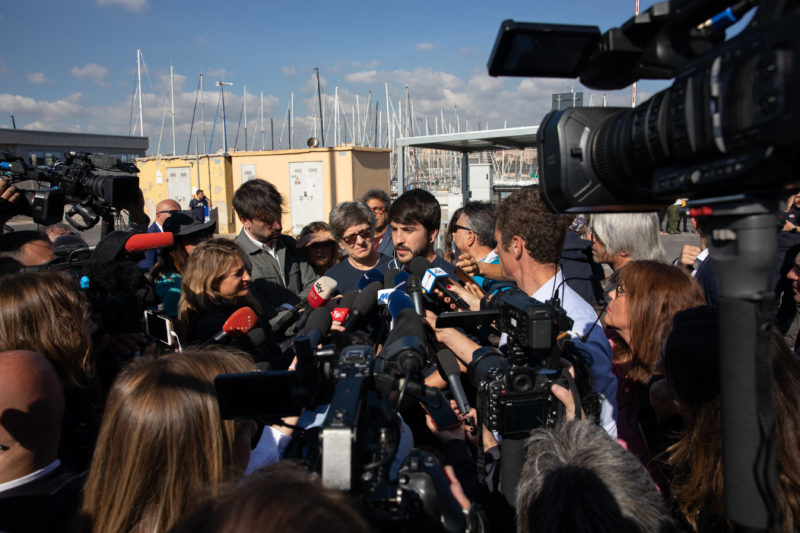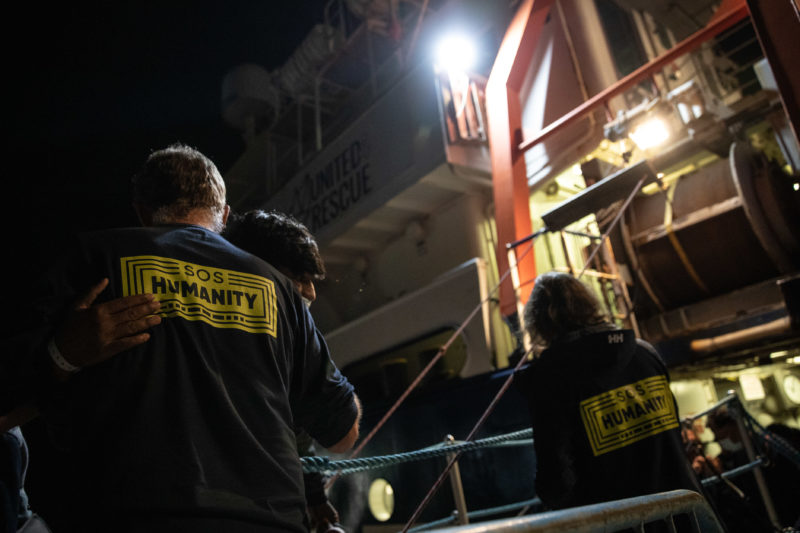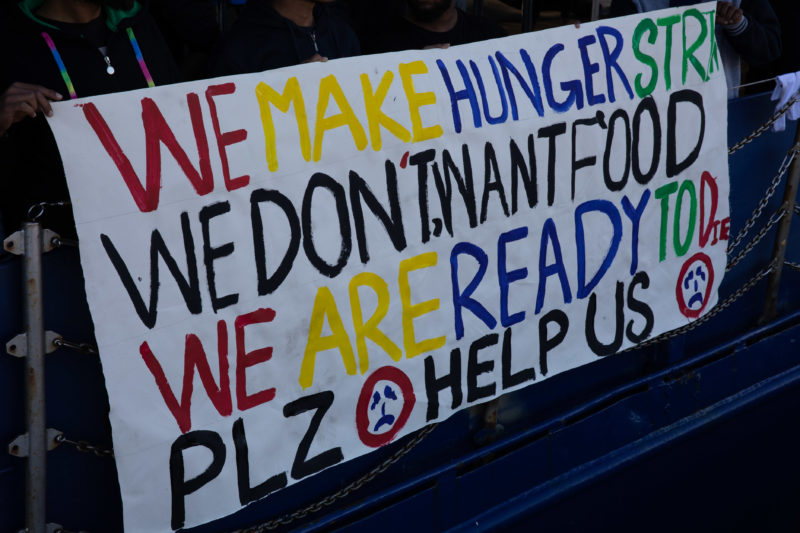Blog from aboard 07 – Part 2

“It was the start of a three-day media hype around SOS Humanity – a small NGO forced to defy a decree from the new government.” Press Officer Petra looks back at the second Search & Rescue Rotation of Humanity 1.
Thursday, 15. november 2022
Part 2 – In the spotlight of the Italian press and global publicity
We are now in the port of Burriana on the east coast of Spain, where the new crew is boarding. Humanity 1’s second search and rescue rotation is over and the third is about to begin. What we have experienced over the past week has been an enormous media onslaught, focusing both on us, as a relatively small NGO, but also on other search and rescue organisations. SOS Humanity was the first NGO to be affected by the new measures taken against NGO ships by Italy’s Prime Minister Meloni. The Italian media in particular, but also leading international media outlets, wanted to report on this in detail. Here’s what happened:
While we were waiting in international waters off Sicily for a safe place to be assigned for the now 179 rescued people on board, after the medical evacuation of one teenager, a heavy storm was forecast for Friday, 4th November. On the weather map we could see that the bay of Catania would offer shelter from the strong wind and high waves. Normally, it is natural for ships to seek shelter near the coast, i.e. in territorial waters, during storms. However, because of the sensitive situation, Captain Joachim preferred to discuss this with the harbourmaster in Catania. He gave the go-ahead, but with the restriction not to sail closer than six nautical miles to the coast. On Saturday evening, the Italian Maritime Coordination Centre (ITMRCC) sent a surprising request for us to enter the port of Catania. But this was not the assignment of a safe place: the day before, the captain had received a decree forbidding him to stay longer in territorial waters than was necessary for the disembarkation of people in distress on board only. It had been signed by three ministers. Without knowing what was coming, the captain followed the order to sail into Catania. The rescued people were informed. When we arrived, we could see that everything was prepared for their disembarkation. The Red Cross was represented by numerous staff, as were the Ministry of Health, a few representatives of humanitarian organisations and two opposition politicians. Four ambulances were there and two buses – not enough for 179 people.

The beginning of the disembarkation went smoothly: as usual, as the most vulnerable group, the unaccompanied minors, disembarked first, including the three young women and one baby. Then the process was interrupted. Two female staff from the Ministry of Health came on board, sent for our doctor and in no time at all turned the onboard clinic into a selection room. It was the middle of the night. The atmosphere was eerie; no one on deck spoke a word. Every few minutes the door of the small clinic opened, and a person who had been rescued came out. Roughly every second person had to sit back down on deck again, while the rest were allowed to leave the ship. Confusion and speechlessness reigned. It was an arbitrary, undignified selection process. The mood of the crew was depressed and helpless. There was nothing we could do.
In the darkness, I walked to the barrier of pier 24, where the Humanity 1 was moored, to see if media representatives were already waiting there for news. Suddenly, numerous camera lights flashed and microphones were held up towards me. The journalists had recognised my crew outfit with the SOS Humanity logo. Dazzled, and taken somewhat off guard, I described the current situation. It was the start of a three-day media hype around SOS Humanity – a small NGO forced to defy a decree from the new government.
In the early morning, the disembarkation process was completed, and the buses, ambulances and numerous staff in their cars drove away. Now it was our job to explain to the remaining 36 people that Italy did not want to let them on land because they were “healthy” and had no “emergency conditions”. At first, our doctor had to retreat in shock. Later, she explained that for the first time in her life she regretted having nursed people back to health. In despair, one of the survivors suffered a breakdown. He didn’t regain consciousness and had to be taken away by ambulance.

It was immediately clear to us that we would resist the illegal decree ordering us to return immediately to international waters – a clear breach of international maritime law and an illegal pushback. According to the Geneva Convention on Refugees, to which Italy is a signatory, refugees may not be returned to states where they are at risk of torture or other serious human rights violations. Every person has the right to an individual protection assessment.
In no time at all, SOS Humanity prepared two urgent legal measures. By the weekend, we had organised legal aid for the 35 survivors. Lawyer Riccardo Campochiaro informed the people on board about their right to international protection. At the civil court in Catania, on Monday, their applications for asylum were filed. In parallel, our appeal against the decree was being prepared at the administrative court in Rome. Only after the majority of those rescued had announced a hunger strike, and after many expressions of solidarity from Italian and international civil society and countless interviews with Italian, German and international press, were they finally let off the boat. The joy and relief were immense. What a joyful moment when all 35 rescued people were sitting in the bus! It was a very emotional farewell that none of us will forget in a hurry.
Next day, in the early afternoon, we quickly set a course to return to international waters. Now we have arrived in Burriana, Spain, we are replenishing our supplies and changing the crew. We want to be back in the central Mediterranean as soon as possible, where people continue to flee, and continue to find themselves in distress at sea. They have the right to be rescued and the right to go ashore in a safe place. We will continue to do everything we can to ensure that these rights are granted. I am glad that I was able to be on board the Humanity 1 during these six weeks.